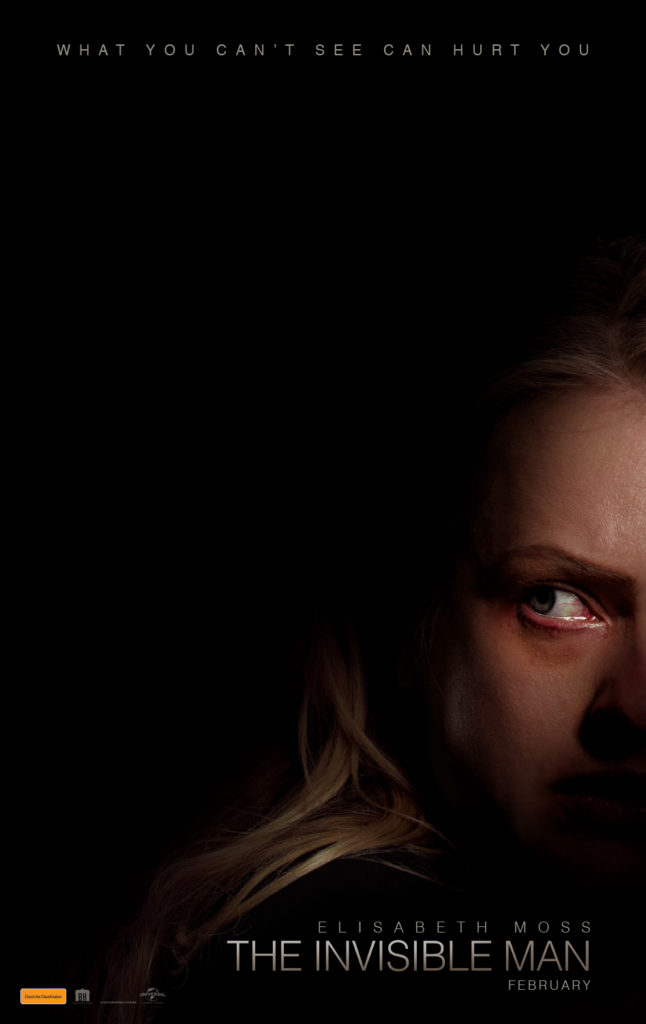
If you recall Tom Cruise's 2017 incarnation of The Mummy, you may also remember that it was supposed to kick off a shared monster continuum called the "Dark Universeâ€, which was already cast and featured one Johnny Depp as The Invisible Man. 2020's The Invisible Man, while still produced by Universal, is not that movie. It's a Leigh Whannell (Upgrade) and Blumhouse special, which means that its budget is so vanishingly small that it should make money no matter what it does. The Invisible Man is not particularly heart warming, but rather a twitchy and paranoid gaslit thriller lead by a woman who can only take so much before she snaps.
Two weeks after Cecilia Kass (Elisabeth Moss, The Kitchen) escapes her abusive husband, he apparently kills himself. Theoretically, Cecilia is free to emerge from hiding, but she has a feeling that her husband is still there, watching her. As Cecilia's credibility with her policeman friend James (Aldis Hodge, TV's City on a Hill) wanes, the invisible presence becomes more active and far more malign.
Leigh Whannell's script and direction make one thing abundantly clear immediately, entirely apart from the title: Cecilia is being terrorised. She becomes understandably more erratic in her behaviour, but we are never given any reason to doubt that what is being presented on the screen is literal. It makes Cecilia's tension our own, and the empathy that we feel lends her entire predicament a strong sense of injustice.
There is a lot to be said for the creeping dread that can be expressed simply through the reactions of Moss. Through The Handmaid's Tale and her person to person work on Mad Men, Moss is accustomed to working alone and reacting to someone who is only there in theory. This is a work of unraveling while maintaining and developing a core of fury to overcome the fear. Moss is not a scream queen; her character has a different path to tread and, while she does not necessarily surprise, the inevitability of her performance thuds into place with a deep satisfaction.
Though husband Adrian has been cast (Oliver Jackson-Cohen, TV's The Haunting of Hill House), he is a cipher, created more by Moss' movements and Cecilia's stories than any concrete actions on his own part. Moss is aided by Hodge and Storm Reid (TV's Euphoria) in the ensemble, but she effectively renders The Invisible Man a one hander.
The Invisible Man is low budget, but in a way that means it doesn't rely on special effects rather than simply looking cheap. Whannell, entirely accustomed to devising Rube Goldberg style machines to brutally dismember his ensembles, uses none of them here. When we eventually see the source of invisible terror, it is designed to trigger latent trypophobia—either that or to put one in mind of a golf ball. When the violence arrives, it is sudden and terrible, but not gratuitous. The audience never feels duped, but The Invisible Man has the taste of constantly wrong-footing the watcher. It's an uneasy experience, but not an unfair one; while it is never optimistic, The Invisible Man doesn't suffer under the weight of Upgrade's hopelessness, which worked there but would not translate here.
The Invisible Man is tight, compact, low budget horror. Whannell has taken the vagaries of an intellectual property and made it his own, with any signs of franchising invisible. Smart and jumpy and powered by an actress accustomed to playing scenes in otherwise empty rooms (are they empty?), The Invisible Man doesn't have bells or whistles, but it has plenty of knives and stabbing — and that's all it needs.
The Invisible Man opened in Australian cinemas on February 27, 2020.
Directed by:Â Leigh Whannell.
Starring:Â Elisabeth Moss, Aldis Hodge, Storm Reid, Harriet Dyer and Oliver Jackson-Cohen.
